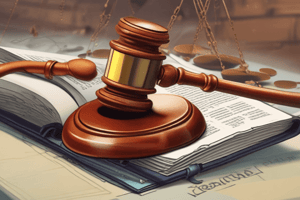Podcast
Questions and Answers
What distinguishes tort law from contractual obligations?
What distinguishes tort law from contractual obligations?
- Tort law is primarily concerned with punitive damages.
- Tort law involves a generalized legal duty to avoid harm. (correct)
- Tort law can only arise from acts of commission.
- Tort law only applies to written agreements.
Which condition is least relevant for establishing a duty to warn in product liability?
Which condition is least relevant for establishing a duty to warn in product liability?
- Effectiveness and feasibility of a warning.
- Consumer's prior knowledge of the product's risks. (correct)
- Probable seriousness of injuries that could occur.
- Potential for an accident when the product is used.
In the context of product liability, which entity is primarily responsible for regulating automobile fuel safety?
In the context of product liability, which entity is primarily responsible for regulating automobile fuel safety?
- CPSC (correct)
- FDA
- EPA
- OSHA
Which of the following statements regarding privity of contract in product sales is accurate?
Which of the following statements regarding privity of contract in product sales is accurate?
What is the primary focus of the certification label required by the Consumer Products Safety Act?
What is the primary focus of the certification label required by the Consumer Products Safety Act?
Which scenario necessitates a warning label on consumer products?
Which scenario necessitates a warning label on consumer products?
What is NOT an essential component of a consumer product warning label?
What is NOT an essential component of a consumer product warning label?
What is the required method for a CSP to submit a formal complaint regarding a safety issue?
What is the required method for a CSP to submit a formal complaint regarding a safety issue?
As a CSP, if you encounter a design you believe is flawed, what is your most responsible course of action?
As a CSP, if you encounter a design you believe is flawed, what is your most responsible course of action?
During a safety inspection, you find a serious safety hazard. Which action should be your initial priority?
During a safety inspection, you find a serious safety hazard. Which action should be your initial priority?
Which statement incorrectly defines ethics in a workplace context?
Which statement incorrectly defines ethics in a workplace context?
When offered a monetary compensation for participating in a HAZOP, what should a CSP consider as the best practice?
When offered a monetary compensation for participating in a HAZOP, what should a CSP consider as the best practice?
Which of the following actions qualifies as fraud in the context of professional conduct?
Which of the following actions qualifies as fraud in the context of professional conduct?
Which of these is considered a canon of professional conduct for safety professionals?
Which of these is considered a canon of professional conduct for safety professionals?
When a safety professional identifies an imminent danger, the most appropriate initial action is to:
When a safety professional identifies an imminent danger, the most appropriate initial action is to:
Which factor is least likely to influence ethical decision-making?
Which factor is least likely to influence ethical decision-making?
How many points are awarded for attending a two-day professional conference that includes at least 50% safety topics?
How many points are awarded for attending a two-day professional conference that includes at least 50% safety topics?
What percentage of safety-related content must be present in a conference for certification points to be applicable?
What percentage of safety-related content must be present in a conference for certification points to be applicable?
Which of the following is NOT a requirement for a safety professional regarding ethics?
Which of the following is NOT a requirement for a safety professional regarding ethics?
When charges of unethical conduct are filed against a Certified Safety Professional, what must be done?
When charges of unethical conduct are filed against a Certified Safety Professional, what must be done?
Which of the following statements accurately reflects the responsibilities of a safety professional according to ethical guidelines?
Which of the following statements accurately reflects the responsibilities of a safety professional according to ethical guidelines?
What is the ethical obligation of a safety professional upon discovering an imminent danger that is not rectified?
What is the ethical obligation of a safety professional upon discovering an imminent danger that is not rectified?
Which act provides protections for individuals with disabilities in the workplace?
Which act provides protections for individuals with disabilities in the workplace?
What does the expression 'res ipsa loquitur' imply in product safety litigation?
What does the expression 'res ipsa loquitur' imply in product safety litigation?
When does the statute of limitations for product liability cases typically start according to recent rulings?
When does the statute of limitations for product liability cases typically start according to recent rulings?
Which statement about the OSHA Hazard Communication Standard is NOT true?
Which statement about the OSHA Hazard Communication Standard is NOT true?
What are punitive damages also referred to in tort law?
What are punitive damages also referred to in tort law?
What indicates an 'Anticipatory Breach of Contract'?
What indicates an 'Anticipatory Breach of Contract'?
What requirement is NOT a part of the OSHA Hazard Communication Standard?
What requirement is NOT a part of the OSHA Hazard Communication Standard?
In what context does 'res ipsa loquitur' apply to negligence claims?
In what context does 'res ipsa loquitur' apply to negligence claims?
What type of damages is intended to punish the defendant in a tort case?
What type of damages is intended to punish the defendant in a tort case?
What is another name for anticipatory breach?
What is another name for anticipatory breach?
Which term describes protection in contracts related to unforeseen natural disasters?
Which term describes protection in contracts related to unforeseen natural disasters?
What type of contract governs leasing a vehicle between a consumer and a dealership?
What type of contract governs leasing a vehicle between a consumer and a dealership?
In disability terminology, what condition does 'Quadriplegic' refer to?
In disability terminology, what condition does 'Quadriplegic' refer to?
Which condition is described by the term 'demented' in disability terminology?
Which condition is described by the term 'demented' in disability terminology?
What does the term 'epileptic' indicate in disability terminology?
What does the term 'epileptic' indicate in disability terminology?
Which legal framework protects a company's trade secrets in the U.S.?
Which legal framework protects a company's trade secrets in the U.S.?
What key element of a valid contract was violated if one party is misled about the nature of the goods being sold?
What key element of a valid contract was violated if one party is misled about the nature of the goods being sold?
Which of the following is NOT considered an essential element of a valid contract?
Which of the following is NOT considered an essential element of a valid contract?
What can indicate that consent in a contract is not free?
What can indicate that consent in a contract is not free?
Flashcards
What is a tort?
What is a tort?
A civil wrong that results in harm to another person, for which a court may provide a remedy. It arises from a general legal duty to avoid causing harm, and can happen through actions (commission) or inaction (omission).
Duty to Warn in Product Liability
Duty to Warn in Product Liability
In product liability cases, this concept requires manufacturers to warn consumers about potential dangers associated with their products. The warning must be clear and effective to prevent accidents.
Privity in Product Liability
Privity in Product Liability
The concept of 'privity' in product liability refers to the direct contractual relationship between two parties. In the case of a product sold through multiple parties, privity only exists between the parties who directly engaged in the sale.
What is NOT part of the Consumer Products Safety Act (CPSA) certification label?
What is NOT part of the Consumer Products Safety Act (CPSA) certification label?
Signup and view all the flashcards
When is a consumer product warning label not necessary?
When is a consumer product warning label not necessary?
Signup and view all the flashcards
What is NOT required on a consumer product warning label?
What is NOT required on a consumer product warning label?
Signup and view all the flashcards
Occupational Safety and Health Act (OSHA)
Occupational Safety and Health Act (OSHA)
Signup and view all the flashcards
Res Ipsa Loquitur
Res Ipsa Loquitur
Signup and view all the flashcards
Product Liability Statute of Limitations
Product Liability Statute of Limitations
Signup and view all the flashcards
OSHA Hazard Communication Standard
OSHA Hazard Communication Standard
Signup and view all the flashcards
Punitive Damages
Punitive Damages
Signup and view all the flashcards
Anticipatory Breach of Contract
Anticipatory Breach of Contract
Signup and view all the flashcards
What should a CSP do when finding a hazardous situation?
What should a CSP do when finding a hazardous situation?
Signup and view all the flashcards
What is ethics?
What is ethics?
Signup and view all the flashcards
Can a CSP accept a flat fee from a contractor for helping with a HAZOP study?
Can a CSP accept a flat fee from a contractor for helping with a HAZOP study?
Signup and view all the flashcards
What should a CSP do when asked to approve a pressure vessel design?
What should a CSP do when asked to approve a pressure vessel design?
Signup and view all the flashcards
Where should a written complaint against a CSP be submitted?
Where should a written complaint against a CSP be submitted?
Signup and view all the flashcards
Anticipatory Breach
Anticipatory Breach
Signup and view all the flashcards
Anticipatory Repudiation
Anticipatory Repudiation
Signup and view all the flashcards
Force Majeure
Force Majeure
Signup and view all the flashcards
Executory Contract
Executory Contract
Signup and view all the flashcards
Quadriplegic
Quadriplegic
Signup and view all the flashcards
Demented
Demented
Signup and view all the flashcards
Epileptic
Epileptic
Signup and view all the flashcards
Uniform Trade Secrets Act (UTSA)
Uniform Trade Secrets Act (UTSA)
Signup and view all the flashcards
Mutual Consent
Mutual Consent
Signup and view all the flashcards
Free Consent
Free Consent
Signup and view all the flashcards
Fraud
Fraud
Signup and view all the flashcards
Misrepresentation
Misrepresentation
Signup and view all the flashcards
Coercion
Coercion
Signup and view all the flashcards
Canons of professional conduct
Canons of professional conduct
Signup and view all the flashcards
Hold paramount the safety, health, and welfare of the public.
Hold paramount the safety, health, and welfare of the public.
Signup and view all the flashcards
Issue public statements only in an objective and truthful manner.
Issue public statements only in an objective and truthful manner.
Signup and view all the flashcards
Stage of moral development
Stage of moral development
Signup and view all the flashcards
Locus of control
Locus of control
Signup and view all the flashcards
Continuing Certification (COC) points for conferences
Continuing Certification (COC) points for conferences
Signup and view all the flashcards
Provide advice only in areas of expertise.
Provide advice only in areas of expertise.
Signup and view all the flashcards
Study Notes
Tort Law
- Tort denotes a common law civil wrong for which a court provides a remedy.
- Tort arises from a general legal duty to avoid causing harm to others.
- Tort can arise through acts of omission and/or commission.
- Tort does not arise from an explicit promissory agreement between parties.
Product Liability and Duty to Warn
- Product liability involves the concept of "duty to warn."
- The potential for an accident if the product is used without warning is a criterion for determining a duty to warn.
- The probable seriousness of injuries is a criterion for determining a duty to warn.
- The effectiveness and feasibility of a warning are criteria for a duty to warn.
- Laws, or regulations, applicable to the warning are not a criterion for determining whether there is a duty to warn.
Regulatory Agencies and Safety
- The EPA regulates automobile fuel safety.
- The CPSC is not involved in regulating car fuel safety.
Privity in Product Liability
- Privity exists between a company that sells a product to another company, which in turn sells the product to a consumer.
- Privity does not exist between the original seller and the consumer who subsequently buys the product from a retailer.
Consumer Products Safety Act
- Manufacturers, distributors, and private labelers of consumer products that are subject to the Consumer Products Safety Act must certify that their products comply with the act's provisions.
- The CPSC identification number is not part of a compliance certification label.
- A statement of compliance is part of the certification label.
- Identification of a manufacturer or distributor is part of the certification label.
- Identification of a private labeler is part of the certification label.
Avoiding Product Warning Labels
- The need for a product warning label is eliminated if the danger is obvious.
Consumer Product Warning Labels
- Warning labels must indicate the potential for harm.
- Warning labels must be easily understood (well-communicated).
- The manufacturer, distributor, or private labeler is responsible for providing the warning.
- The applicable PEL or TLV is not required on consumer product warning labels.
Workers' Rights and Abilities for the Job
- Decisions on whether workers can do the job are made using the Americans with Disability Act.
Res Ipsa Loquitur
- Res ipsa loquitur is a legal principle where it is assumed a party's injury was caused by another party's negligence.
Product Liability Statute of Limitations
- The statute of limitations for product liability cases begins to run when an injury occurs.
OSHA Hazard Communication Standard
- The OSHA Hazard Communication Standard addresses hazardous chemicals.
- Hazardous chemical manufacturers, importers, or distributors must prepare container labels.
- Hazardous chemical manufacturers, importers, or distributors must create Safety Data Sheets (SDSs).
- Employers are responsible for providing mandatory training for those who have potential or exposure to hazardous chemicals.
Punitive Damages
- Punitive damages are also known as exemplary damages.
Anticipatory Breach of Contract
- Anticipatory breach of contract occurs when one party stops performing according to contract terms.
- Anticipatory breach can also be known as anticipatory repudiation.
Force Majeure in Contracts
- Force majeure clauses provide protection for parties if unforeseen events prevent contract fulfillment.
Executory Contract
- A contract for car leasing is classified as executory.
Quadriplegic in Terminology
- A quadriplegic is a person with a spinal cord injury.
Demented
- A person described as demented usually has Alzheimer's disease.
Epileptic
- A person termed epileptic has seizure disorders.
Trade Secrets
- The Uniform Trade Secrets Act (UTSA) protects trade secrets.
Valid Contract Element (Offer and Acceptance)
- A crucial element of a valid contract is mutual consent of each party.
Essential Elements of a Valid Contract (Money)
- Monetary considerations are not an essential element of a valid contract; rather, consideration is a fundamental concept.
Free Consent in Contracts:
- Free consent is a fundamental; fraud, misrepresentation, and coercion can invalidate contractual consent.
- All three of these can invalidate contract consensus
Professional Conduct (Safety Professionals)
- Safety professionals are bound by ethical codes of conduct.
- One such code requires them to prioritize public safety, health, and well-being.
- The safety professional should be truthful and objective in their public statements.
- Safety professionals are expected to act as faithful agents for their employers when performing their services.
Responding to Imminent Danger Hazard:
- When a safety professional identifies an imminent hazard, the most appropriate action is to notify the supervisor and recommend corrective actions.
Ethical Decision-Making:
- Variables which affect ethical/unethical decision making include stage of moral development and organizational environment.
- Language background does not affect ethical/unethical decision making.
Continuance of Certification (COC)
- Certified Safety Professionals earn points by attending professional conferences.
- Conferences must have at least 50% safety-related material to be eligible.
COC Points for Conferences:
- Attending a 2-day professional conference with at least 50% safety-related matter entitles one to 1 COC point.
Safety Professional's Code of Ethics
- Following the professional's code of ethics to provide a safe work environment, involves advice and consultation only within their area of expertise.
- Ethical conduct means reporting imminent workplace dangers that are not corrected, not providing advice outside expertise and not requesting disciplinary actions for unsafe acts repeatedly
Reporting Unethical Conduct
- Reports of unethical conduct against a certified safety professional should be addressed in writing, along with a copy given to the affected individual.
Expert Consultation for Safety Professionals
- A certified safety professional should use their expertise in any professional and regulatory duties; they can't take on tasks outside their expertise.
Safety Inspection and Immediate Action
- If a safety professional finds a hazard that is immediately dangerous, they should first inform the responsible supervisor and work toward immediate corrective action.
- In case of imminent threat, the immediate action should focus on safely mitigating the threat first.
Conflict Between Morality and Law or Ethical conduct:
- Legal requirements, religious beliefs, and family/friends' beliefs can sometimes conflict with moral principles.
Studying That Suits You
Use AI to generate personalized quizzes and flashcards to suit your learning preferences.




